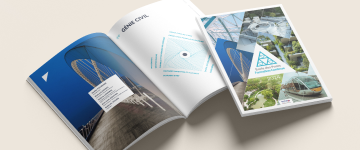Objectifs pédagogiques
RCC-CW was published in 2010 and 2012 as ETC-C for EPR nuclear power plant. The most recent RCC-CW editions (2015 to 2019) can be applied to PWR projects.
The training session explains the requirements of the part C Construction of the RCC-CW code.
TRAINING OBJECTIVES: The purpose of this 2 day training session is to outline the requirements of the ETC-C and RCC-CW codes. Dedicated to the Construction (Part C) of the code, it covers all the aspects of the construction for Civil engineering structures of nuclear power plants (geotechnics, seismic analysis, concrete, prestressing, liner, anchorages, steel works…). Part M of the code dedicated to leak tightness tests and resistance tests on containment is also presented.
Programme
Jour 1
Opening and introduction to the session
Topography, tolerances, monitoring
Geotechnical
Jour 2
Structural steelwork.
Concrete for the safety classified building
Jour 3
Passive reinforcement
Anchor systems
Post tensioning systems
Jour 4
Leaktight metallic part on containment
Pools and tanks
Leak resistance tests and containment monitoring
Conclusion, evaluation
Public
Civil engineers with responsibilities for coordination and execution of works on EPR projects, who look for transition training covering the key changes between the Euronorms and the ETC-C/RCC-CW.
Pré-requis
Pédagogie
-Questionnaire d’autopositionnement (prérequis, expériences, attentes), fil rouge assuré par le coordinateur expert ou un référent de PFC, temps d’interaction avec le(s) expert(s) et les apprenants, apports théoriques et méthodologiques, illustrations concrètes, exemples d’application, étude de cas, quiz, retour d’experience. Evaluation des connaissances : exemples d’application, étude de cas, quiz..
Training is delivered remotely in English
Évaluation
Exemples d’application, étude de cas, quiz…

